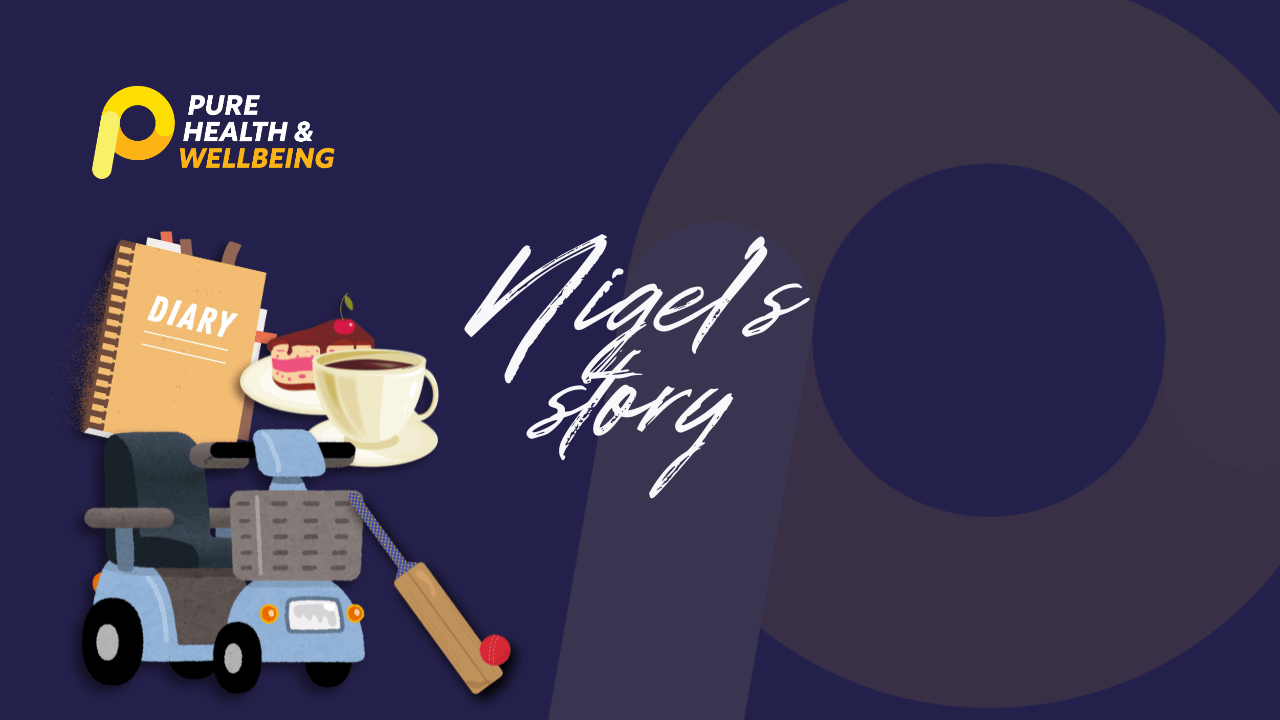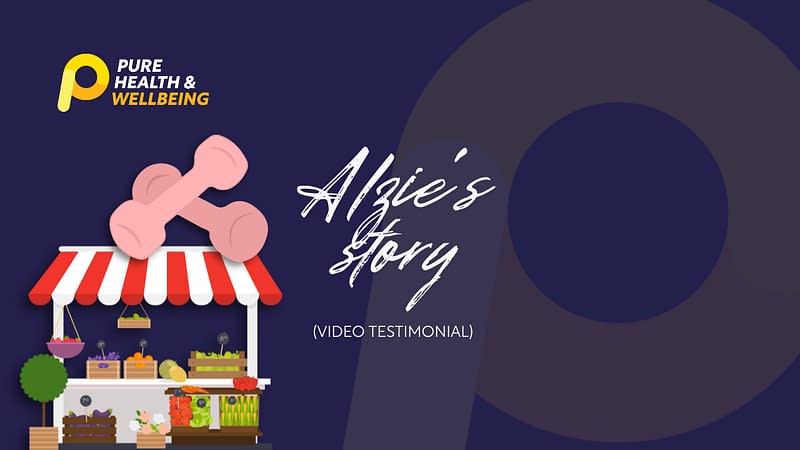Case study: 12 week rehabilitation programme reduces pain and improves confidence
Chronic pain affects up to 50% of the UK population (BMJ, 2019). Our Chronic Pain and Long Term Conditions service is designed to help individuals manage their pain and improve their quality of life.
Chronic pain is persistent or recurring pain that lasts longer than 12 weeks. Most clinicians recognise the challenge of long-term MSK conditions, but there can be an inconsistent approach to addressing these challenges. We have developed a programme to help individuals suffering with chronic pain, to ensure they are getting the best possible care, addressing their individual concerns, and reducing pressure on the NHS.
Expectations of the effects of chronic pain and long-term conditions
This case study explores the impacts of the programme for our patient, Nigel. Nigel was joined by his wife Wendy for the first session to support his journey, but then decided to take part in the subsequent sessions.
From the first encounter, Nigel commented:
“I knew I was being referred to a pain management clinic, but really did not have much expectation other than more or different drugs. I had not heard of the service or its approach to helping people with long term pain. It was explained at the start how the course would proceed, made clear that help was just a phone call away if needed. All our questions were answered with great patience and clarity.”
Nigel, in common with many pain patients was demonstrating ‘fear avoidance.’ This is a reaction to pain in which normal movements and activities are avoided due to the fear that they may be aggravating the pain and causing damage to the body.
The Physiotherapist working with Nigel spent time explaining about fear avoidance and reassuring him that the activities he was avoiding were not harmful. She noted that Nigel’s confidence improved with each session and he and Wendy were starting to see improvements in their quality of life.
As part of the programme, Nigel was also seen by a Health and Wellbeing Coach, who worked with him every week to help him set and achieve his goals, reassure him that the planned activities would be safe and beneficial and motivate him to move more. The Health and Wellbeing Coach noticed that Nigel was initially apprehensive: he had been trying to improve his pain for several years and nothing had worked for him. Nigel used a wheelchair, but he set one of his main goals to be able to stand for longer without the need for his wheelchair.
What the programme aims to achieve
Our service provides rehabilitation services to individuals suffering from personal injuries, clinical negligence, and other health issues. We offer a wide range of services, including; corporate health programmes, psychological services, rehabilitation case management, pain assessment, immediate needs assessment (INA), and more. Most recently, we introduced a long-term conditions programme to help patients with chronic pain. Persistent musculoskeletal (MSK) pain takes up to 30% of a GP’s caseload (HEE, 2020).
Our approach to help patients manage their pain
Our pain management programme follows the biopsychosocial model, which, in addition to the medical causes of pain, considers the impact of psychological and social factors. We apply the developing evidence that recognises the relationships between these factors in the production of pain.
Nigel commented,
“The course demonstrated such a radical way to look at long-term pain that it was a bit difficult to take in at first, but as the weeks went by it all started to make sense. The resources on your website, particularly My Journal and the videos at the start of the course, made me realise that there is a definite alternative to increased drug usage to manage my pain.”
The course is based on patients collaborating with our experienced pain practitioners working closely with specialised Health & Wellbeing Coaches. Individual patient goals are agreed and a programme put in place to work towards the goals and improve life quality.
Nigel worked initially to improve his strength, balance and mobility using enjoyable exercises devised by the team. He improved each week. The Health & Wellbeing Coach introduced Nigel and Wendy to the concept of pacing to help ensure that they were able to sustain their gradual improvement and not fall into the common trap of overdoing things and then paying for it by increased suffering over subsequent days. Nigel reported that once he had established this approach, he was free of pain most days.
Long term conditions programme structure and activities
Patients are introduced to a series of modules allowing them to develop effective pain management strategies. These modules include:
- Identifying and modifying pain-related thoughts and behaviours
- Implementing relaxation techniques and coping skills
- Enhancing physical activity and exercise routines
- Optimising sleep patterns and nutrition
- Cultivating resilience and stress management techniques
At the conclusion of the programme, patients report:
- A deeper understanding of their pain and how they can influence it.
- Learning personalised pain management strategies.
- Improved overall health and wellbeing.
- Better quality of life.
- Benefit from ongoing access to our web-based resources.
Instilling confidence in our patients through our 12-week programme
Our 12-week Long Term Conditions programme has proven to be a beacon of hope, restoring not just physical wellbeing but also installing confidence to the lives of our patients. At the end of the programme, Nigel said,
“Discussing achievements and problems with the Health & Wellbeing Coach each week for the first few weeks really kept me going – her enthusiasm is so infectious, and she was really easy to relate to; keeping an activity and pacing diary made me see for myself how much I was achieving, and in such a short time.
I cannot believe the difference this course has already made, not just to my life but to Wendy’s as well. Losing my mobility at the start of Covid meant I had almost become a hermit, but that has all changed! I have started to pace activities using a kitchen timer which helps me stop before I get too tired, and I’ve learned not to feel guilty, any job can always be finished later. I look forward to my daily exercises which have helped considerably with my breathing, balance and mood, and the delicious feeling of well-being that comes from the relaxation videos.
I have more confidence moving around and being with people again. We have been out for meals, taken the dog to town and stopped for coffee and cake, I’ve been to the cricket on my scooter, and we have met up with friends. I’ve even helped Wendy in the garden and try to get out there on each dry day. I still fill in a daily diary, noting down timing/pacing, activities, mood, pain-free episodes as well as flare-ups, which has helped me stay positive.
I am so pleased to have this opportunity to say formally how much we have appreciated the support of you [N and R, Pain Practitioner and Health & Wellbeing Coach]. ”
The Health & Wellbeing Coach said once Nigel had completed his programme,
“On our last call Nigel told me he had surprised Wendy by setting the table while she went out to collect their evening meal, something he hadn’t done in years. He was so proud of himself, and this was truly a testament to all the progress he had made over the 12 weeks as he was finally able to stand for long enough to do so. It has genuinely been a pleasure to be a part of Nigel’s journey and watch his confidence grow each week. I have no doubt this progress will continue and good luck to Nigel and Wendy as they embark on this exciting new chapter!”
Nigel also shared his thoughts following the programme,
“I am so pleased to have this opportunity to say formally how much we have appreciated the support of N and R.
I have already cut down on the amount of paracetamol I have been taking so, on good days, if I have forgotten to take a dose on time, I now leave them out rather than taking them late and adjusting the timing of later doses.
The weekly phone consultations with N and R, have been something we have both looked forward to. We have been able to discuss things openly with you both, getting helpful advice when I have experienced problems (“don’t beat yourself up about it” has become our new mantra), and superb encouragement with even a tiny success.
My improved PSEQ score was a lovely surprise after such a short time, for which I thank you both. I feel so much more positive, confident, and forward-looking. Yes, I must continue to work at this constantly, but the rewards far outweigh the effort needed. I now feel that I am in control of my pain, it doesn’t control me, and it’s a wonderful feeling. A huge thank you from both of us for opening a new chapter in our lives.”
Understanding the data
The PSEQ (Patient Self Efficacy Questionnaire) scores which have been mentioned throughout this study are a benchmark to determine improvements throughout the programme, measuring a patients’ confidence levels in managing their pain.
Patients score themselves from 0 (not at all confident) to 6 (completely confident) against range of criteria. This is then translated to a score of between 0 and 60, where a score of 40 or above shows the patient as confident in managing their pain. For this reason, it’s always great whenever we have a patient leave the programme with a score above 40 as it shows they are more likely to self-manage long-term.
Nigel’s case demonstrates how PSEQ score is not an indicator or reflective of the patients’ physical capabilities but shows how confident they feel about moving forward in life despite their pain.
Nigel began the programme with a score of 12/60, and after several weeks this was improved to a score of 27/60. By the end of the programme, he scored 55/60.
It is important to note that scores are individual benchmarks, and every patient is different. While our goal is always to maximise this score, we also want to ensure that the patient feels their objectives have been met. In this instance, we feel Nigel and Wendy have reached their objectives, alongside a very positive outcome in their PSEQ score.




